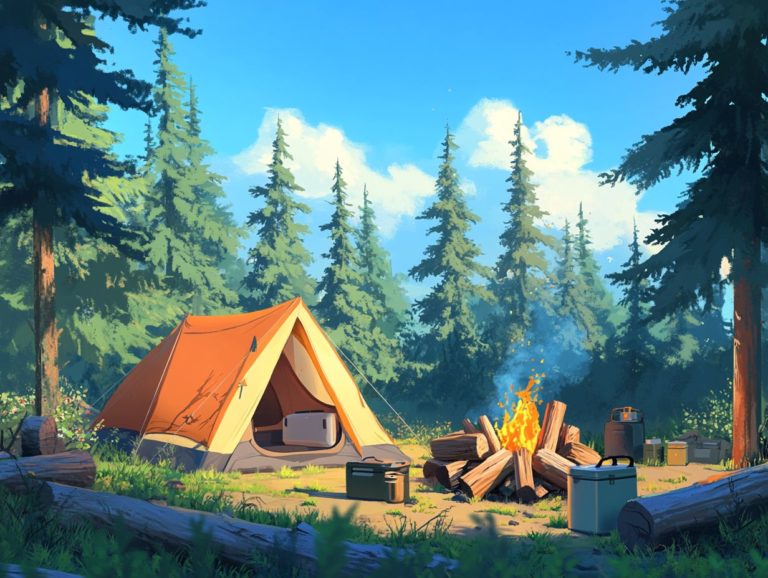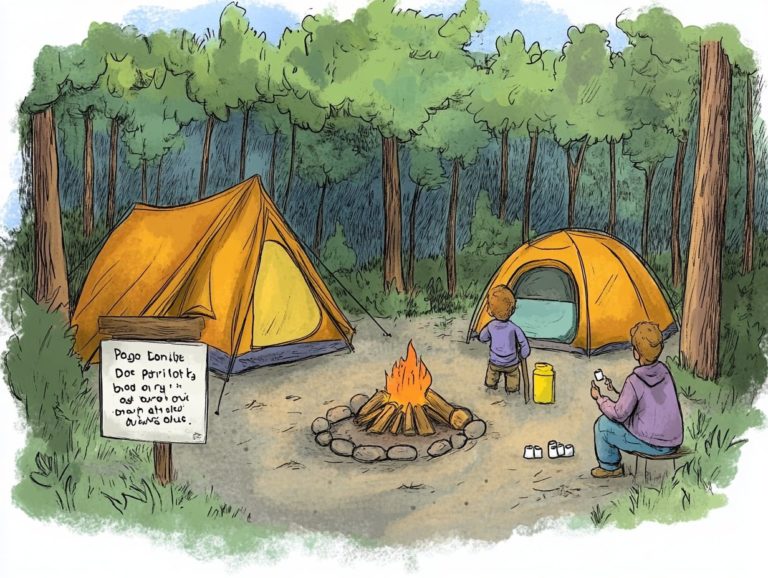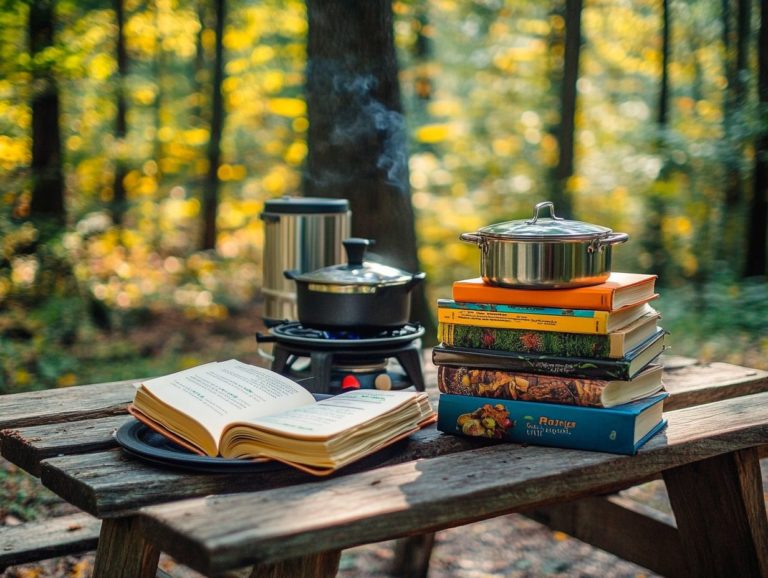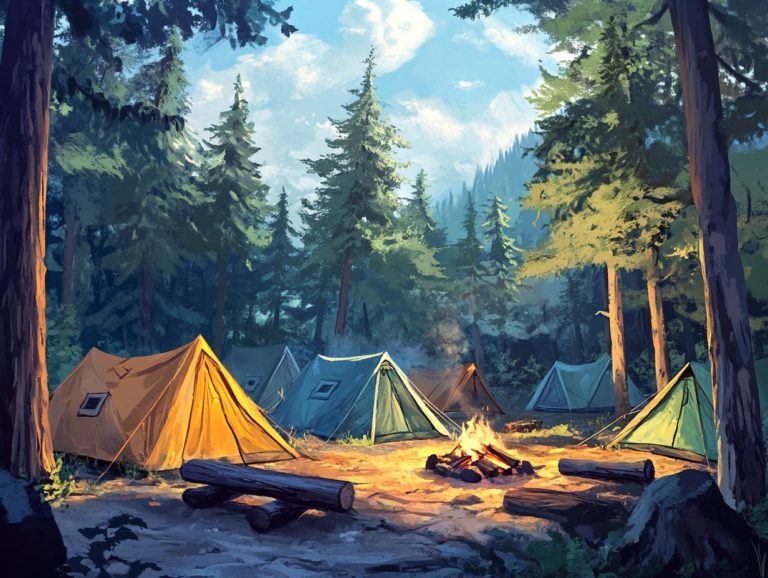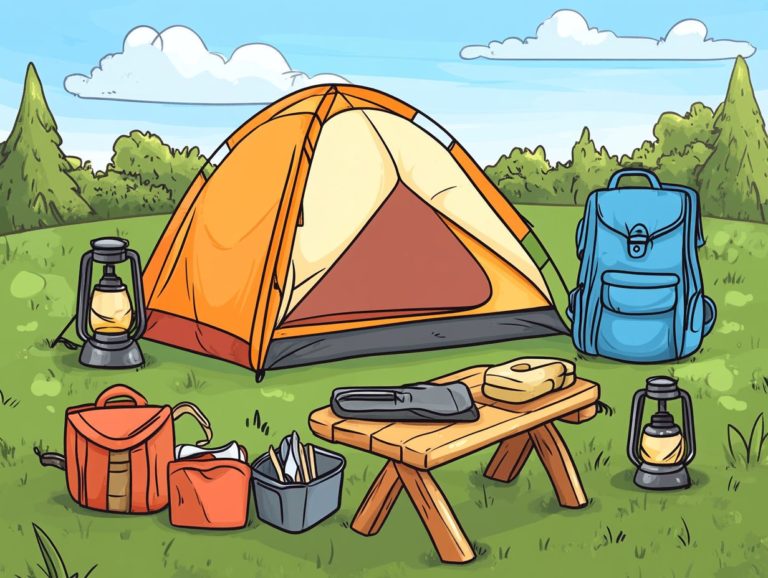5 Essential Camping Gear Items for Beginners
Heading out into the great outdoors can be an exhilarating experience, especially for someone new to the adventure. Having the right gear is essential to ensure your journey is both safe and enjoyable.
This guide delves into the five must-have camping essentials:
- A reliable tent for your camping trip preparation,
- A cozy sleeping bag,
- A portable camping stove,
- A well-stocked first aid kit,
- And a trusty headlamp or flashlight.
It also offers insightful tips on selecting each item while highlighting common pitfalls to steer clear of. Whether you’re embarking on your first camping trip or refreshing your gear, this guide will equip you with everything you need for a successful outdoor experience.
Contents
- Key Takeaways:
- 1. Tent
- 2. Sleeping Bag
- 3. Camping Stove
- 4. First Aid Kit
- 5. Headlamp or Flashlight
- What Other Gear Items Are Important for Camping?
- How Can a Beginner Choose the Right Tent?
- What Features Should Be Considered When Choosing a Sleeping Bag?
- How Can a Beginner Camping Safely Use a Camping Stove?
- What Should Be Included in a First Aid Kit for Camping?
- How Can a Headlamp or Flashlight Be Useful During Camping?
- What Are Some Common Mistakes to Avoid When Choosing Camping Gear?
- Frequently Asked Questions
Key Takeaways:
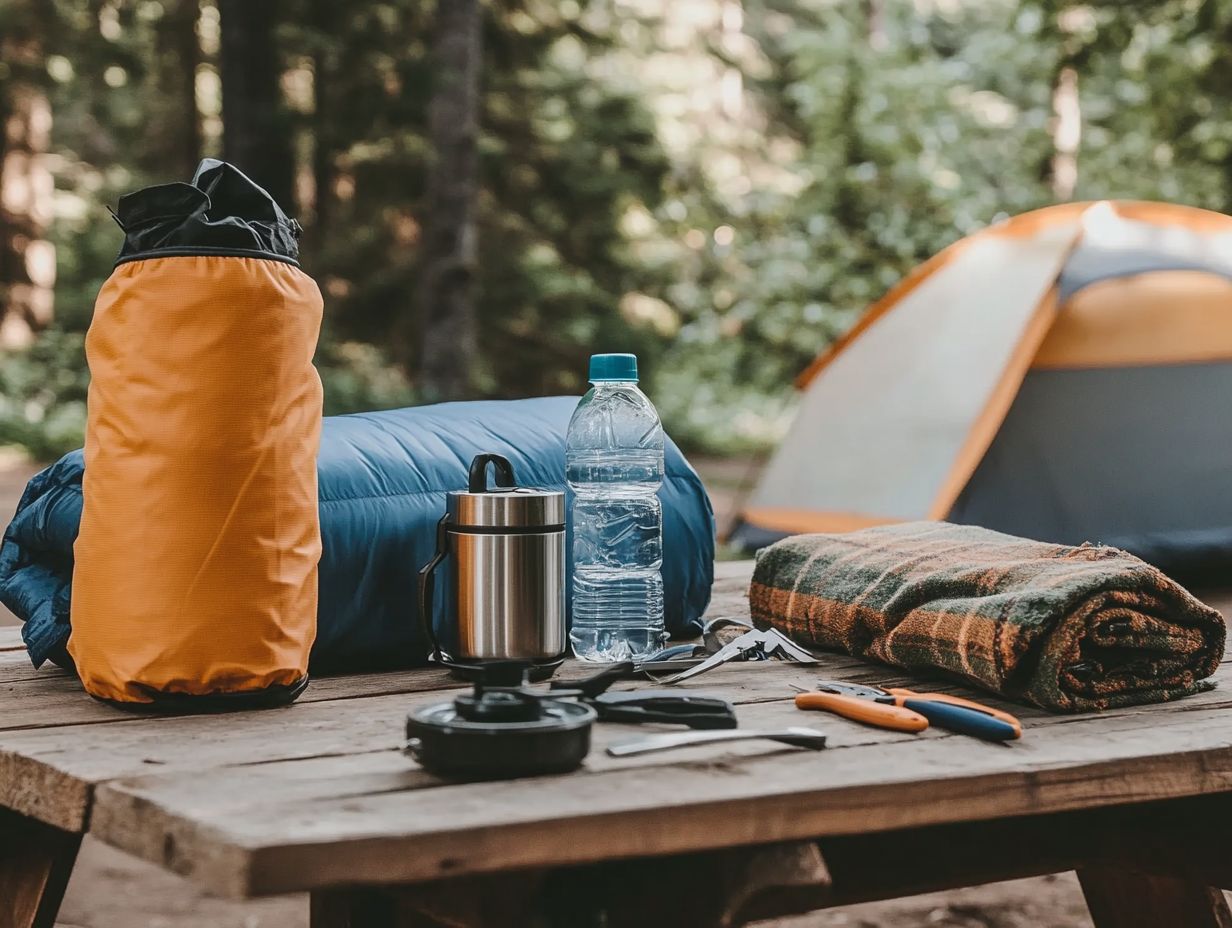
A tent is essential; it provides shelter and protects you from the elements.
A quality sleeping bag is a must-have for a cozy night!
A camping stove is necessary for cooking meals safely, especially for beginners.
1. Tent
Choosing the right tent is essential for your outdoor adventure, particularly if you re a beginner gearing up for your first camping trip. A well-chosen tent lays the groundwork for both comfort and security while you’re immersed in nature.
It serves not just as shelter but also significantly enhances your overall camping experience and enjoyment. With a myriad of options at your fingertips dome tents, backpacking tents, and family-sized models the secret to choosing the right tent is knowing what you need.
Consider factors like size; it s crucial to ensure everyone can fit comfortably without feeling cramped. Weather resistance is another vital aspect, safeguarding you against unexpected rain or gusty winds.
Popular brands such as Coleman and REI offer many options to suit various preferences and budgets. Regarding setting up your tent, location matters; opt for a flat area that s clear of debris, and be sure to stake it down securely to fend off any disturbances from the wind.
Don t underestimate the comfort of a sleeping pad or air mattress these can significantly enhance your experience, allowing for a restorative slumber beneath the stars.
2. Sleeping Bag
A sleeping bag is a fundamental piece of gear that can significantly enhance your comfort during camping, ensuring you remain warm and cozy whether you find yourself in the mountains of New Hampshire or at a local campsite.
When selecting the right sleeping bag, it s essential to consider factors like climate and your personal comfort. For example, multi-season sleeping bags offer versatility, accommodating a range of temperatures, while lightweight options are ideal for backpackers aiming to minimize pack weight.
It s also important to ensure a snug fit, as this helps to retain your body heat. When you pack your sleeping bag, remember to roll it instead of stuffing it; this preserves its loft. Using a compression sack can make transport easier.
Regular maintenance such as cleaning and proper storage will extend its lifespan, granting you many nights of restful sleep under the stars.
3. Camping Stove
A camping stove is a critical tool for your outdoor cooking endeavors. It allows you to whip up meals with ease and efficiency, ensuring your camping experience is both enjoyable and satisfying.
Check out the variety of camping stoves designed just for you, from compact backpacking stoves ideal for solo adventurers to larger models designed for family excursions. Portable gas stoves are popular for their convenience, while wood-burning stoves provide an eco-friendly option that aligns with nature s rhythm.
Many stoves feature straightforward ignition systems and adjustable flame controls, making them accessible even for those new to cooking outdoors. Don’t forget essential cooking utensils like pots, pans, spatulas, and storage containers; they can elevate your culinary experience in the wild. For a successful adventure, consider exploring the essential gear for a successful backpacking trip.
Setting up an efficient camp kitchen is crucial. Choose a flat surface for your cooking, prioritize safety, and organize your cooking area to minimize clutter while maximizing functionality.
4. First Aid Kit
A well-stocked first aid kit is an absolute must for any camping trip. It offers peace of mind and safety, whether you re a novice or a seasoned camper. This kit effectively addresses potential outdoor hazards.
In the wilderness, even the tiniest mishap can escalate into something serious if not handled properly. That’s why it’s essential to have 5 must-have items for winter camping like:
- adhesive bandages for minor cuts and scrapes.
- antiseptic wipes to cleanse wounds.
- gauze pads for more substantial injuries.
If you encounter insect bites, a soothing cream will be your best friend. A sling can help immobilize any sprained limbs. Don t forget about a pair of tweezers for splinter removal and scissors for cutting tape or clothing these tools are crucial for your kit.
Knowing how to use these supplies correctly ensures you can tackle potential injuries swiftly and effectively. Be ready for anything!
Keep in mind that being aware of environmental hazards like uneven terrain or the presence of wildlife can significantly lower your risks during your adventure.
5. Headlamp or Flashlight
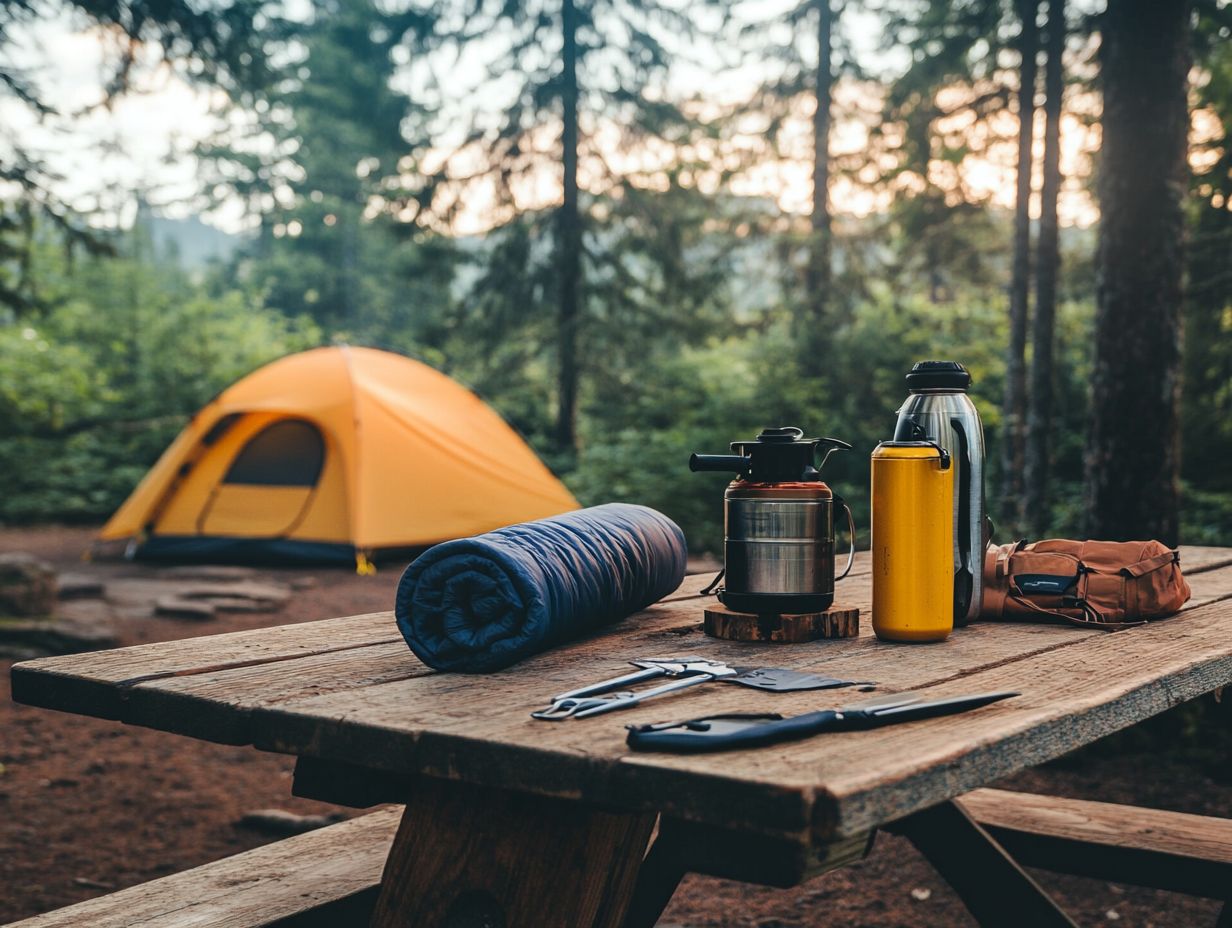
A headlamp or flashlight is an essential companion for moving around your campsite after the sun goes down. It provides dependable lighting that enhances both safety and convenience during your outdoor adventures.
While both tools serve the vital function of illuminating your surroundings, they each come with unique features tailored to different needs. For example, a headlamp offers the luxury of hands-free operation, allowing you to work or walk without juggling a light source.
Flashlights typically deliver a more powerful beam and longer-range visibility, making them perfect for spotting distant objects. As you prepare for your camping trip, consider the activities you plan to tackle.
If you’ll be on the move or require both hands for tasks, a headlamp may be your best bet. Always pack extra batteries and explore rechargeable options to ensure you have reliable lighting. Don t forget to check the battery life before you venture into the wilderness.
What Other Gear Items Are Important for Camping?
When you re getting ready for a camping trip, understanding the extensive range of camping gear and essential items beyond the basics can truly enhance your outdoor experience. It can help create unforgettable memories.
Consider foldable chairs; they offer a comfortable spot to relax after a day of hiking. A reliable water filtration system is vital for safe hydration, especially in remote areas where finding clean water might be a challenge.
Having the right clothing for different weather conditions can significantly boost your comfort and safety. Opt for high-quality fabrics that keep you dry and layer your clothing to manage temperature swings effectively.
A solid camping checklist is your best friend; it keeps you on track and ensures you are fully prepared! Including essential camping tools every camper needs can help you fully immerse yourself in the beauty of nature without a worry in the world.
How Can a Beginner Choose the Right Tent?
For beginner campers, selecting the right tent can feel like a daunting task. However, grasping essential features such as size, weight, and weather resistance can streamline your decision-making process.
It s important to assess your specific camping needs. Start by measuring how many occupants you ll have, as tents come in a range of capacities, from cozy solo options to spacious family sizes.
Next, consider the tent’s weight, particularly if you have long hikes planned opting for a lighter design could make your journey far more enjoyable. Think about the different seasons of your trips; a three-season tent can offer reliable protection across various conditions.
Lastly, remember to practice setting up your tent in your backyard before you set off on your adventure. This not only boosts your confidence for the great outdoors but also helps you identify any missing components ahead of time. Additionally, consider checking out 5 innovative camping gadgets you need to enhance your camping experience.
What Features Should Be Considered When Choosing a Sleeping Bag?
When selecting a sleeping bag, consider features like insulation type, temperature rating, and size. These factors ensure a warm and comfortable night s sleep while camping.
Among the insulation options available, down and synthetic materials stand out, each with its unique advantages. Down insulation is highly regarded for its lightweight nature and compressibility, delivering an excellent warmth-to-weight ratio that makes it perfect for backpacking adventures.
On the other hand, synthetic insulation shines with its superior moisture resistance. It retains heat even when wet, making it a reliable choice for those damp conditions you might encounter.
Temperature ratings are crucial; they guide you in selecting a sleeping bag that matches the weather you can expect during your trip. Understanding how to layer your clothing adds warmth, ensuring even the coldest nights under the stars feel cozy.
How Can a Beginner Camping Safely Use a Camping Stove?
Ready to cook in the great outdoors? Mastering the safe use of a camping stove is crucial for your outdoor cooking endeavors. It allows you to whip up delicious meals while minimizing risks in your camp kitchen.
Set up your stove on a stable surface away from flammable materials like dry leaves or your tent. Always keep water nearby for emergencies. This dramatically lowers the risk of an unintended fire.
Pay attention to the wind direction while you cook. By following these precautions, you ll elevate your outdoor cooking experience and foster a safer environment for everyone sharing the adventure.
What Should Be Included in a First Aid Kit for Camping?
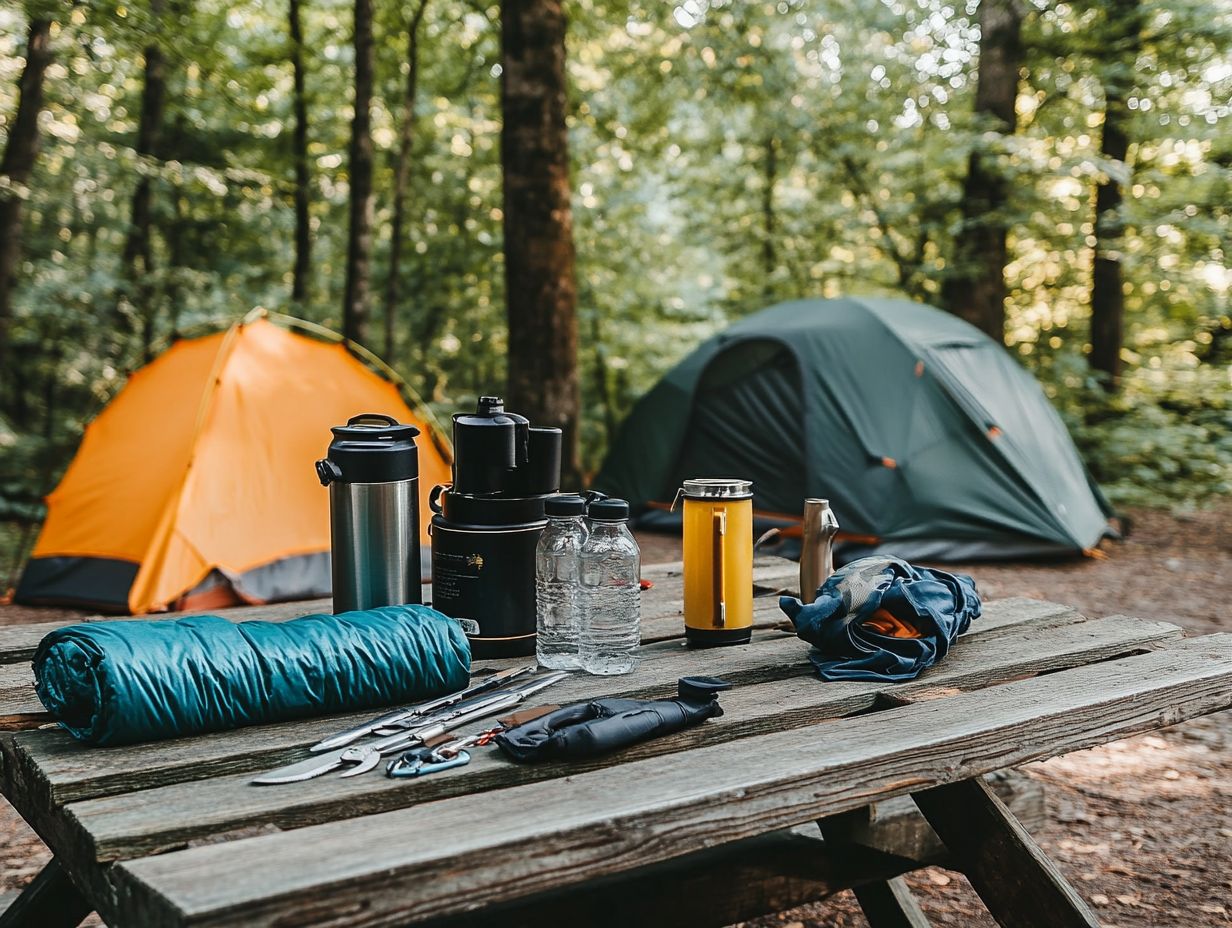
Your camping first aid kit should have bandages, antiseptics, and pain relievers. Pack larger items like sterile gauze pads for larger wounds, adhesive tape to secure dressings, and tweezers for removing splinters or ticks.
A digital thermometer is a smart addition to help monitor body temperature in cases of illness or heat exhaustion. Having pain relievers on hand, such as ibuprofen or acetaminophen, can offer relief from aches and fevers.
A first-aid manual or guide can be invaluable in unfamiliar situations, providing instructions for various injuries. Considering these components highlights the importance of outdoor safety; being prepared can significantly reduce risks when venturing into nature.
Properly organizing your first aid kit boosts your confidence and enhances safety, allowing you to fully enjoy your camping experience.
How Can a Headlamp or Flashlight Be Useful During Camping?
A headlamp or flashlight is essential for your camping adventures, offering reliable lighting that boosts both safety and convenience. With these tools in hand, you can navigate tricky terrain and tackle tasks after dark with ease.
Setting up your tent in low visibility becomes a breeze, as the light illuminates your surroundings without the hassle of holding it. When it’s time to cook, a dependable light source ensures you can manage your equipment and prepare meals efficiently, so you won’t miss a crucial step. For a successful trip, don’t forget to check out the best camping gear for solo travelers.
To find the perfect lighting option tailored to your needs, consider factors like battery life, brightness levels, and weight. Perhaps you prefer a headlamp for hands-free operation, or maybe a flashlight that delivers a powerful beam for longer distances suits you better. Understanding your specific needs can significantly elevate your camping experience.
What Are Some Common Mistakes to Avoid When Choosing Camping Gear?
When choosing camping gear, you might find yourself falling into some common traps, like packing too much, picking the wrong items, or not considering the unique demands of your camping environment.
It’s easy to overlook the impact of local weather patterns, which can significantly influence what gear is essential for your trip. For instance, a lightweight tent may work well for milder conditions but could leave you vulnerable in heavy rain or fierce winds.
Disregarding how much weight you can carry can turn your adventure into a grueling trek, transforming what should be an enjoyable experience into a tedious slog.
Avoid these traps by using a camping checklist! It s your ticket to a stress-free adventure. By carefully listing the necessary items tailored to specific conditions, you can ensure you re well-prepared without the hassle of excess gear weighing you down.
Frequently Asked Questions
What are the 5 essential camping gear items for beginners?
The 5 essential camping gear items for beginners are:
- A tent
- A sleeping bag
- Cooking supplies
- A first aid kit
- A backpack
Do I need to invest in an expensive tent?
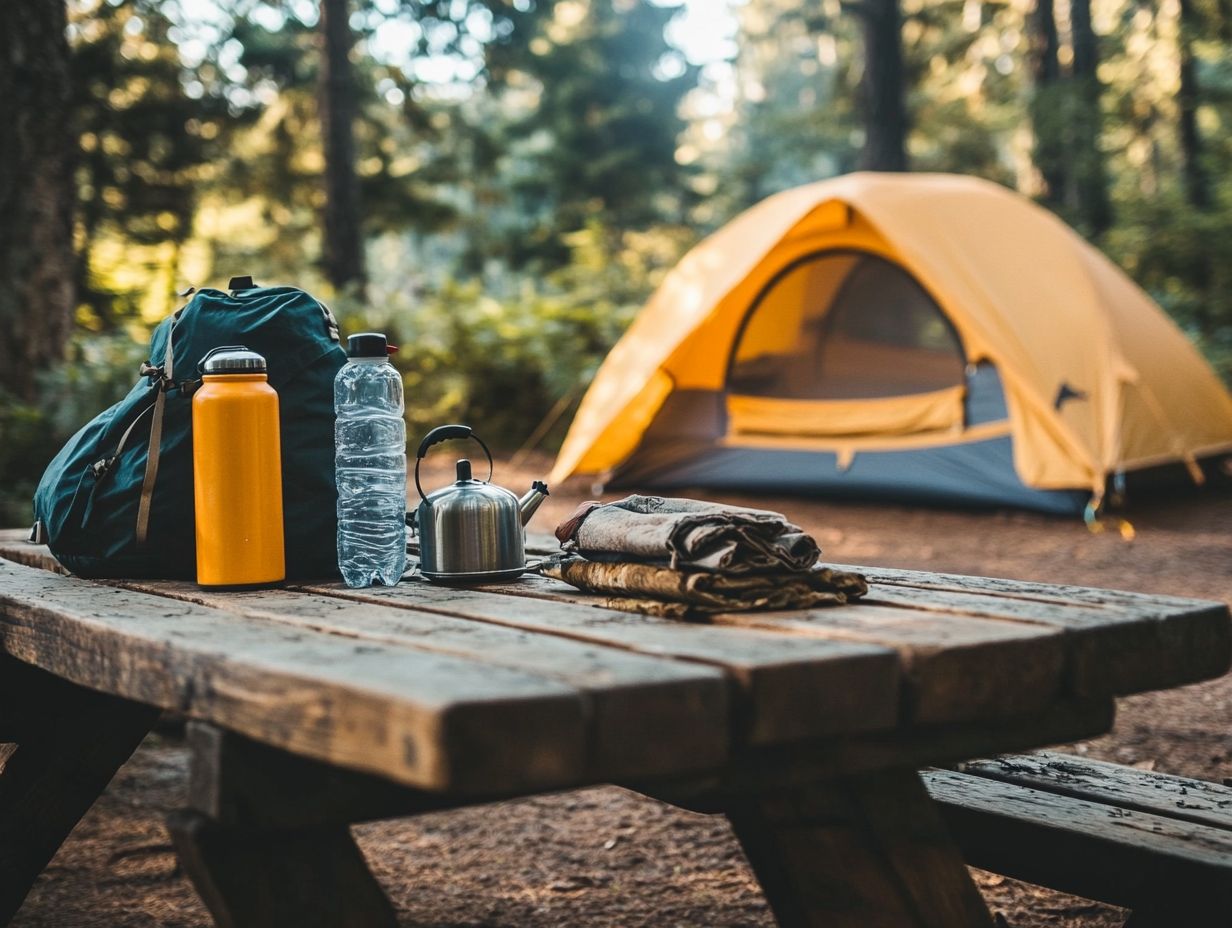
It’s not necessary to invest in an expensive tent as a beginner, but it’s important to choose one that is durable and can withstand different weather conditions.
What type of sleeping bag should I purchase?
The type of sleeping bag you should buy depends on the weather and temperature of your camping location. Make sure to research and choose one that will keep you warm and comfortable.
What cooking supplies should I bring?
Some essential cooking supplies to bring on a camping trip include:
- A portable stove
- Cooking utensils
- A cooler for food storage
- Basic ingredients such as oil and spices
Why is a first aid kit necessary for camping?
A first aid kit is necessary for camping as it can help with minor cuts, burns, and other injuries that may occur during outdoor activities. It’s crucial to always be prepared for any unexpected situations.
What size backpack should I bring?
The size of your backpack will depend on the length of your camping trip and how much gear you need to bring. As a beginner, it’s recommended to start with a smaller and more manageable backpack.
Get ready for your adventure now!

